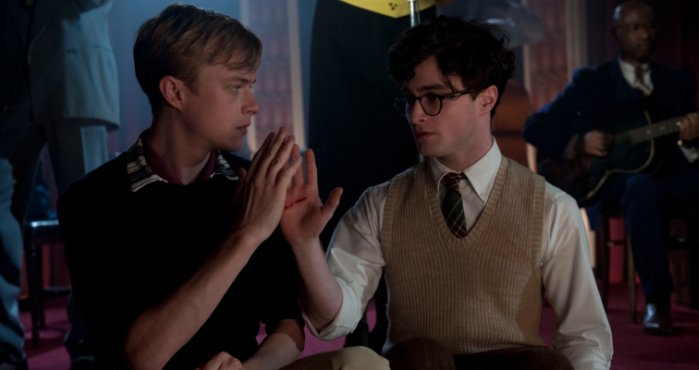At some recent juncture, popular culture began treating important figures an awful lot like superheroes. Movies like 42, Hyde Park on Hudson, jOBS and more seek to distill famous people to easily digestible qualities while weaving their lives into palatable narratives. It seems like a natural extension of American individualism and the “great man” worldview of history. Kill Your Darlings takes this trend into depicting the beginnings of the Beat Generation almost like a superhero origin and team-up story. It’s The Avengers with copious drug use.
It’s 1943 and young Allen Ginsberg (Daniel Radcliffe) has just started college at Columbia. He’s an aspiring writer, but feels stifled by the rigid convention he’s taught in his classes. Then he meets Lucien Carr (Dane DeHaan), a brilliant troublemaker who enjoys screaming obscene poetry in the library. Soon, Carr introduces Ginsberg to fellow nonconformists Jack Kerouac (Jack Huston) and William S. Burroughs (Ben Foster), and the merry band is off into a new world of mind alteration and literary invention. They have a counterculture to brew up, after all. But at the same time, Carr has a stalker, David Kammerer (Michael C. Hall) whose advances get more and more uncomfortably close, putting the group on a path towards violent confrontation.
The best parts of Kill Your Darlings have to do with the cast acting the parts of these legendary writers in a sort of prototype mold. Radcliffe’s Ginsberg is meek and phlegmatic, his emotional maelstrom still mostly repressed, coming out only when he imbibes some mood-alterers. Huston plays Kerouac as the badass writer, a manly bro who nonetheless already has a million words to his credit. Foster is quietly great as Burroughs, a slightly alien presence with bone-dry unflappability that’s frequently amusing. DeHaan, though, is the standout. He is a master of ephebic intensity, and his Carr practically radiates charisma. In this film’s version of events, Carr’s “New Vision” feels perfectly plausible as the catalyst for the Beat sensibility.
But the film itself doesn’t really capture that sensibility. At first, this seems like it may be an asset, creating a remove from these characters that could let the audience judge them from some viewpoint other than admiration of their status in artistic lore. But whenever the movie attempts to get inside their heads, it flounders. When Ginsberg writes, it uses a clueless, Dead Poets Society approach, trying to make writing into a dynamic act with silly quick-cutting and wackiness (At one point, he’s lying on his back, making running motions. Creativity!). When he takes drugs, it’s art school lite, such as a scene where he moves about freely while a jazz club is frozen in time (The only part where black people show up, incidentally). It’s another movie about artists that can’t quite convey the artistic process.
Outside of the nascent cultural upheaval, the movie is able to get fitful interest out of having these characters simply bounce off one another. Paradoxically, the scenes in which they participate in any story-driven actions feel leaden, mainly because the Baby Beats acts of rebellion are embarrassingly lame. Oh, they put banned books into the general circulation of the library. Allow me to straighten my monocle and unruffle my cravat.
The hesitant romance/not-romance between Ginsberg and Carr is more intriguing. Radcliffe and DeHaan have lustful friction to spare, and the way it ties in to Ginsberg’s awakening homosexuality and sense of self is well-drawn. The movie also wrings great nuance out of the relationship between Carr and Kamperer, whom Carr seems to lead on, thrilled by the attention, just as much as Kamperer creepily follows. Less riveting is a subplot about Ginsberg dealing with his distant father (David Cross) and mentally ill mother (Jennifer Jason Leigh), too underdeveloped to leave an impression. There’s also Kerouac’s relationship with his girlfriend Edie, but it’s mostly just her haranguing him to marry her over and over again, and a tremendous waste of Elizabeth Olsen.
Kill Your Darlings is an alright character bit, even though it’s a poser when it comes to the Beat spirit. As is standard for biographical dramas, one doesn’t have to be familiar with the Beats to understand or appreciate the film. It’s a good showcase for some of our most talented working young male actors, but not much more.




















